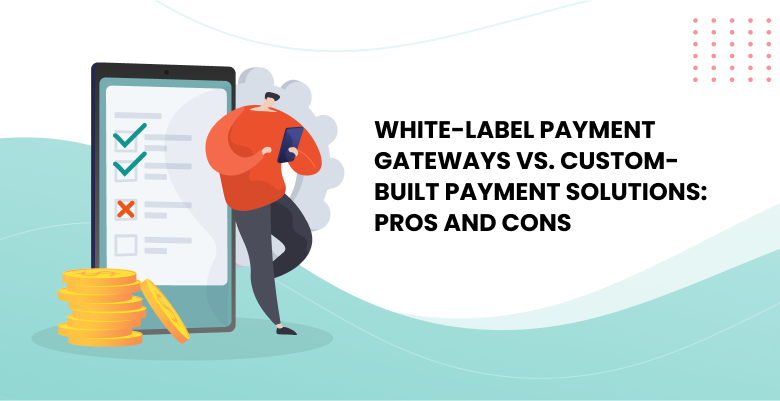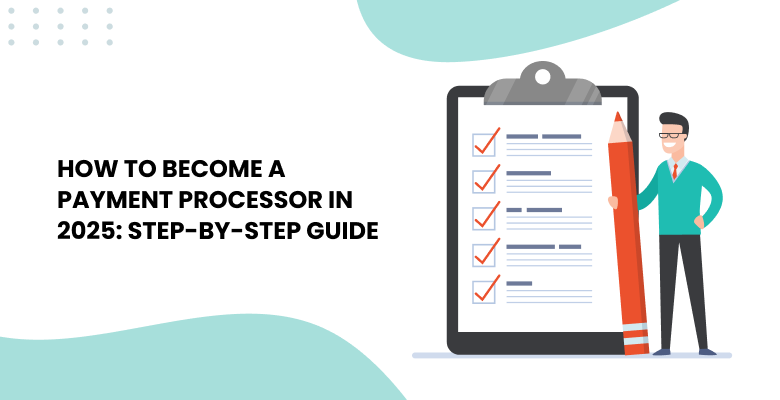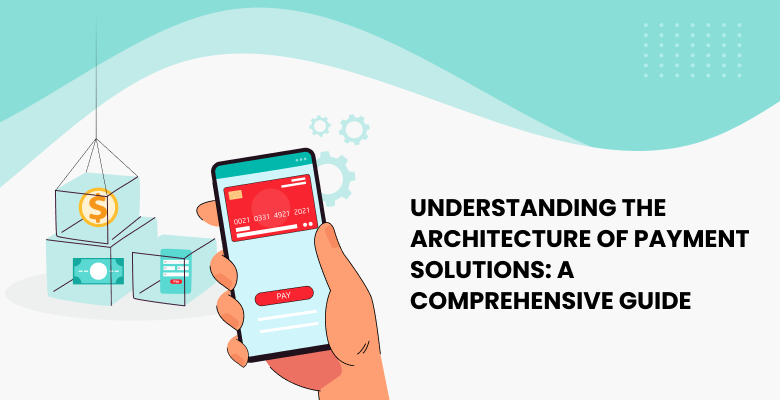
- What are custom-built payment solutions?
- Custom-built payment solutions: advantages
- Custom-built payment solutions disadvantages
- What is a white-label payment gateway?
- Benefits of white-label payment gateway
- White-label payment gateway disadvantages
- White-label payment gateway vs. independent development: What to choose for your business
- Key aspects to consider when choosing a white-label payment gateway provider
- Wrapping up
These days, the fintech industry is revolutionizing the way we manage money. From mobile banking apps to peer-to-peer payments, fintech solutions simplify financial processes. However, for an effective business operation, you must know how to handle the core payment processes.
Are you dreaming of joining the ranks of innovative fintech companies? This is where two primary options enter the scene: a white-label payment gateway and a custom-built solution. The tough choice between these two approaches can be a complex one, significantly impacting business operations and customer satisfaction. In this article, we will navigate through the strengths and weaknesses of each approach to help you pick the best solution for your company’s needs and goals.
What are custom-built payment solutions?
Custom payment solutions are payment systems built from scratch by the vendor. They are tailor-made to your business’s exact needs. They offer maximum control and flexibility over every aspect of the transaction process, from design and functionality to security measures.
Custom-built payment solutions: advantages
Custom-built payment solutions offer unlimited control and flexibility. Let’s discover the other pros this option proposes:
Unlimited customization
With a custom-built payment solution, you have complete control over the features and functionalities offered by the platform. Do you need a specific payment method integrated or want a unique checkout flow to enhance the customer experience? A custom solution tailors your payment process to your particular business model and target audience, boosting conversion rates.
Competitive advantage
A custom solution is a powerful tool for your brand differentiation. The option lets you develop functionalities that set you apart from competitors, which is especially beneficial when you target specific demographics or offer niche products.
No vendor lock-in
Custom solutions offer you complete ownership and control without relying on specific vendors. Such freedom allows you to adapt and evolve your payment system as your business needs change. You’re free to modify, update, or even migrate your payment system to a different platform in the future, providing greater flexibility in the long run.
Additional profits
For businesses with increased transaction volumes, custom solutions open up additional revenue streams. Think about offering niche payment processing services to other companies or integrating built-in currency exchange or mobile wallets to capture fees as extra profit. Additionally, you can try loyalty programs or other value-added services, potentially generating further revenue opportunities.
Custom-built payment solutions disadvantages
Next, you will find some challenges to examine before your final decision:
High development costs
Developing a custom payment solution requires a significant upfront investment in terms of time, money, and resources. This includes hiring the development team and other employees, developing the product from the ground up, thorough testing, Payment Card Industry Data Security Standards (PCI DSS) compliance, etc. Overall, the cost of a Minimum Viable Product (MVP) of a payment gateway can vary from $350K to $700K and higher, depending on the range of features and technologies the system provides.
Ongoing maintenance
Post-launch, the responsibility for maintaining the system and implementing updates falls solely on the business. Generally, system maintenance costs the vendor about 20% of the initial development cost yearly. Plus, resolving any issues the system experiences also falls on the vendor’s shoulders. This continuous requirement can strain resources, particularly for smaller companies without dedicated IT teams.
The need for an experienced payment team
A custom-built solution necessitates a highly experienced payment team to help merchants and their customers optimize their payments and assist with any questions they might have. Recruiting and retaining such employees can be challenging and expensive, especially for smaller businesses.
Legal liability
When building a custom payment solution, the business assumes all legal liabilities associated with handling customers’ payments and sensitive data. This includes ensuring compliance with various regulations, handling data breaches, and managing disputes. The legal ramifications can require specialized legal knowledge and resources.
What is a white-label payment gateway?
Compared to a custom-built payment solution, a white-label payment gateway is a ready-to-use payment software developed by a third-party vendor and distributed as Software-as-a-Service (SaaS). It is a PCI DSS-certified system designed by industry experts and typically equipped with the latest payment technologies.
Businesses can adopt a white-label payment gateway on a subscription basis. After partnering with a particular vendor, they will set up the system for the client’s needs, tailoring the technologies and integrations according to their request.
Benefits of white-label payment gateway
The best white-label payment gateway offers a compelling solution for businesses that need a fast, cost-effective, and reliable way to accept payments. Among the key advantages:
Fast implementation
The payment gateway white-label solution eliminates the lengthy development cycles needed for custom solutions. It is ideal for companies looking to go to market swiftly without investing substantial time in development as a white-label payment gateway allows you to start your operations in two weeks. Powered by a payments orchestration platform, this solution streamlines payment processing, enabling seamless integration with multiple payment providers and methods. With white-label solutions, you can gain a competitive edge on the market, surpassing those who spend years on their software development.
Lower costs
White-label payment gateways typically have a subscription or per-transaction fee structure, making them more budget-friendly. With lower upfront costs, you can avoid the expenses associated with hiring a development team, conducting extensive testing, and maintaining the system over time. The subscription-based pricing models make white-label solutions particularly attractive to companies that want to start their own payment business without the high costs of custom development.
Reliability
White-label solutions are built by verified payment vendors who ensure their products meet industry standards and regulatory requirements. Established white-label providers invest heavily in the security, functionality, and compliance of their solutions to protect their reputation and customer base. This leads to fewer technical issues, smoother transactions, and enhanced customer satisfaction.
PCI DSS compliance
White-label payment gateways come with built-in compliance with the Payment Card Industry Data Security Standards. Achieving and maintaining PCI DSS compliance on one’s own is a complicated and resource-intensive process. By using a white-label solution that already adheres to these standards, your payment systems meet stringent security requirements, and sensitive data is protected.
Multiple payment integrations under one roof
White-label payment gateways support a variety of payment methods and integrations, offering a comprehensive solution for businesses. This includes credit and debit cards, digital wallets, bank transfers, and more for streamlined payment processing. This all-in-one approach simplifies the implementation and management of diverse payment methods, making it easier for businesses to accommodate customer preferences and expand into new markets.
Innovative payment technologies
Leading white-label payment gateway providers continuously innovate to incorporate the latest payment technologies – smart routing and cascading, tokenization, fraud detection algorithms, mobile payment support, payment analytics, etc. By leveraging these advanced technologies, you enhance security and efficiency without investing in developing them internally.
White-label payment gateway disadvantages
However, there are still some cons to take into account:
One-size-fits-all approach
Purchasing a white-label solution often means you get a standardized system that lacks feature-addition capability. This limitation can be a significant drawback for SMBs that require highly specific functionalities to differentiate themselves in a competitive market. Select a software provider that offers solution customization if you need to incorporate unusual features.
Limited control over branding
Although you can achieve some branding customization, white-label solutions may not fully align with a company’s branding strategy. The level of customization typically features basic branding elements such as logos and color schemes. However, more complex customizations, such as unique user experiences, specialized features, or integration with proprietary systems, might not be possible. This partial branding can lead to a less cohesive customer experience compared to a fully integrated custom solution
White-label payment gateway vs. independent development: What to choose for your business
Choosing between a white-label payment gateway and a custom solution depends on your business resources, but it also mirrors the broader debate of legacy vs modern payment software, where flexibility and cost-efficiency play a pivotal role. Consider your budget, technical expertise, and long-term growth goals for a successful payment process. If you prioritize a highly customized solution with a strategic focus on brand differentiation and flawless integration, a custom solution may be a good match.
However, if speed to market, affordability, and valid infrastructure are your priorities, a white-label gateway is a cost-effective alternative that eliminates money, time, knowledge, and a team. Instead, you get an independent development and a competitive edge in the market.
Key aspects to consider when choosing a white-label payment gateway provider
First off, ensure the provider adheres to the highest security standards (PCI DSS compliance is a must) and has a proven track record of protecting sensitive customer data. Also, verify compliance with relevant payment regulations for your target markets. This contains understanding local data protection laws and industry-specific regulations so your business remains compliant and avoids potential legal and financial penalties.
Second, pay attention to the various payment methods offered by a payment gateway. Look for a provider that offers popular credit and debit card processing, as well as integration with major e-wallets like PayPal, Apple Pay, and Google Wallet. The ability to offer multiple payment methods provides flexibility and convenience, which leads to higher conversion rates and customer satisfaction.
Third, opt for a transparent pricing structure that aligns with your projected transaction volume. Look for detailed information on setup fees, monthly fees, transaction fees, and any additional charges for specific services or features. A transparent pricing model allows you to accurately budget for your payment processing needs and avoid unexpected financial limitations.
Wrapping up
With the rise of new regulations, technologies, and emerging customer demands, building a sustainable payment ecosystem is a must-have. Looking for software that meets all the latest technologies? Akurateco, a cutting-edge white-label payment software provider, knows how to cut development costs and time enabling you to focus on growth. Feel free to book a Free Demo of our system and see what it’s capable of. Our team will gladly assist with any questions you may have. No strings attached.






